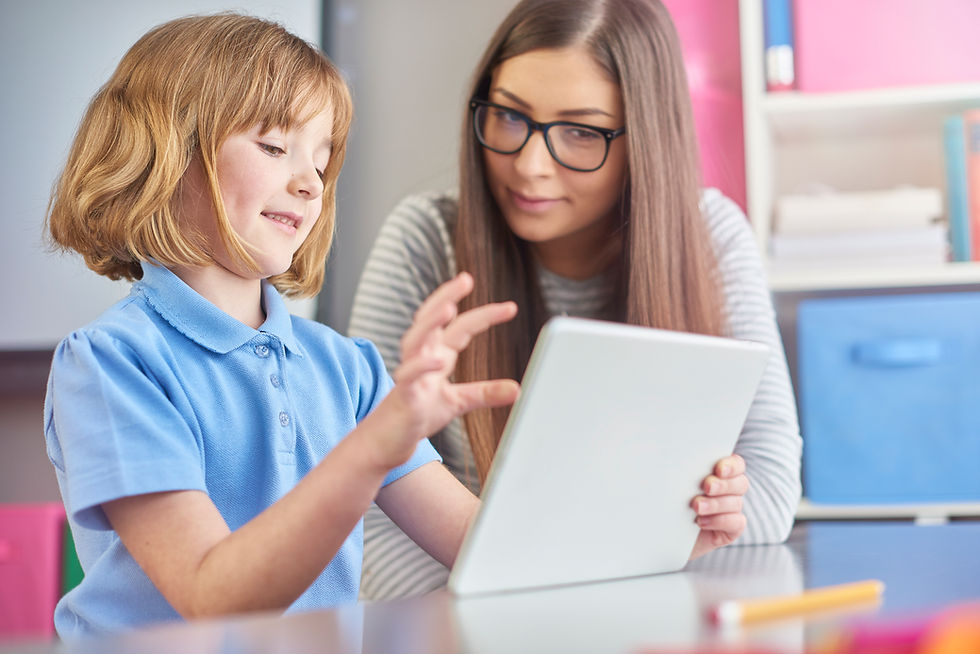Unlocking the Power of Words: Language Milestones for 2-Year Olds
- Aimée Pharr

- May 26, 2023
- 4 min read
Updated: Jun 15, 2023

The first few years of a child's life are marked by remarkable growth and development, with each milestone opening up new possibilities and fostering the journey towards independence. Among these milestones, language development plays a crucial role in shaping a child's ability to communicate, connect, and understand the world around them. As parents, understanding the expected milestones for your 2-year-old can help you support their development and provide them with a strong foundation for future learning. Let's dive into language acquisition and explore the key milestones you can expect during this stage.
Expanding Vocabulary
Just before the age of 2, your little one's vocabulary will experience significant growth. They will start to use more words, with an average vocabulary of about 200-300 words by their second birthday. You may notice them referring to themselves by name and with pronouns, such as I, me, my, and mine. Encourage their development by engaging in conversations about the world around you, reading books together, and introducing new words during everyday activities, such as grocery shopping, cooking, cleaning, driving in the car, and doing laundry. Playing games such as “Hide and Seek” while dressing will assist your child in learning their body parts.
Basic Sentence Formation & Following Simple Directions
As your 2-year-old continues to develop their language skills, you'll notice them attempting to string words together to form short sentences. Although these sentences may not be grammatically correct or complete, they are a significant step towards effective communication. Simple phrases like "Me go" or "Boy bike" become more frequent as they begin to express their needs and desires. Encourage their budding language skills by expanding on and extending their sentences, while modeling correct grammar. Be sure not to correct or criticize them. For example, when your child says, “Dog bark,” you might expand on the sentence by saying, “Yes, the little dog is barking loudly.” You could then extend the utterance by saying, “He must be barking at the mail truck.” Also at this stage, 2-year olds typically understand and follow simple instructions, such as "Please bring me the toy" or "Let's go outside." Your child may love to “assist” with household chores and doing a “job” alongside you.
Asking and Answering Questions
The curious nature of 2-year-olds often leads them to explore the world around them, and their language development reflects this inquisitiveness. You'll find them asking questions such as "What's that? Where is Mommy?,” or "Why?" as they seek to understand their environment. Encourage their curiosity by providing simple and age-appropriate answers. Engaging in conversations and asking open-ended questions yourself can also foster their language skills while promoting critical thinking and problem-solving abilities. Children at this age also respond to simple questions, such as “Where is your blankie?” or “Who is that?” Model appropriate answers to the questions you ask. For example, if you ask “Where is your blankie?” and your child doesn’t respond, you might say, “I think your blankie is on your bed. Let’s go see!”
Naming Real and Pictured Objects and People
Around the age of 2, children typically begin to recognize and name familiar objects and people in their lives. They may point to an object and say its name or label family members and pets. Encourage this milestone by labeling objects around the house, pointing out people's names in family photos, and engaging in interactive games that involve identifying and naming objects. Games such as Hot and Cold, Odd Man Out, and a Scavenger Hunt are among my favorites. Picture books with clear, colorful images can be particularly effective in helping your 2-year old associate words with visual representations. Ask questions like, "Can you find the doggie?" or "Which one is blue?" to engage their attention and encourage active participation.
Nonverbal Communication
While words are an essential aspect of language development, non-verbal communication also plays a vital role in a 2-year-old's ability to express themselves. They may use gestures, facial expressions, and body language to convey their needs, wants, and emotions. Pay attention to their non-verbal cues, as they often provide insights into what they're trying to communicate. Encourage their non-verbal communication by mirroring their gestures, maintaining eye contact, naming their emotions, and responding with warmth and empathy.
The journey of language development is an exciting and pivotal time. By understanding the expected language milestones for 2-year olds and actively supporting language acquisition, you can help your child build a strong foundation for effective communication and future learning. Remember to celebrate each milestone and create a nurturing environment that encourages natural curiosity, exploration, and problem solving. Through meaningful interactions, reading, and play, you can unlock the power of words and set your child on a path to confident and expressive communication.
If your 2-year-old has a limited vocabulary, struggles to understand and follow simple instructions, and does not yet combine words, it may indicate a potential language delay. Consult a speech-language pathologist for an evaluation and guidance on fostering your child’s language development. Early intervention through language therapy can play a vital role in addressing language delays, providing targeted support, and promoting effective communication skills. Remember, every child develops at their own pace, and with the right support and nurturing environment, your child can unlock the power of words and thrive in their language journey.
You may wish to reach out to Anne Arundel County Infants and Toddlers for a free screening or contact a private pediatric speech-language pathologist for an evaluation.
Holding Hands Speech offers free, initial consultations and would love the opportunity to assist you and your child as you embark on this exciting journey.
#holdinghandsspeech #speechtherapist #languagedevelopment #languagemilestones #languagedelay #SLPkids #speechtherapy #speechpathology #SLP



